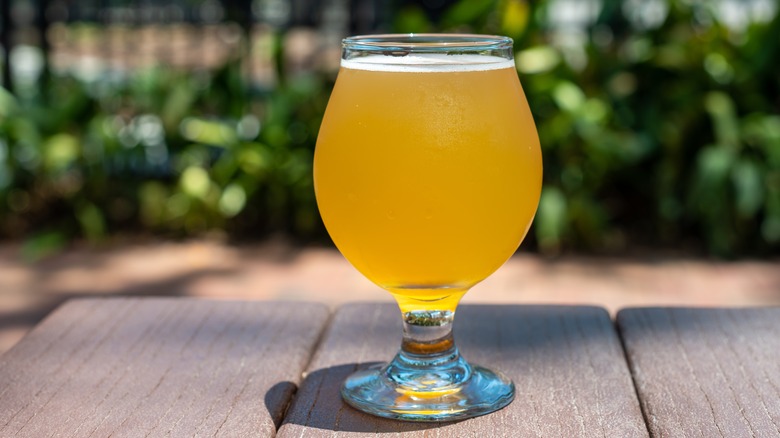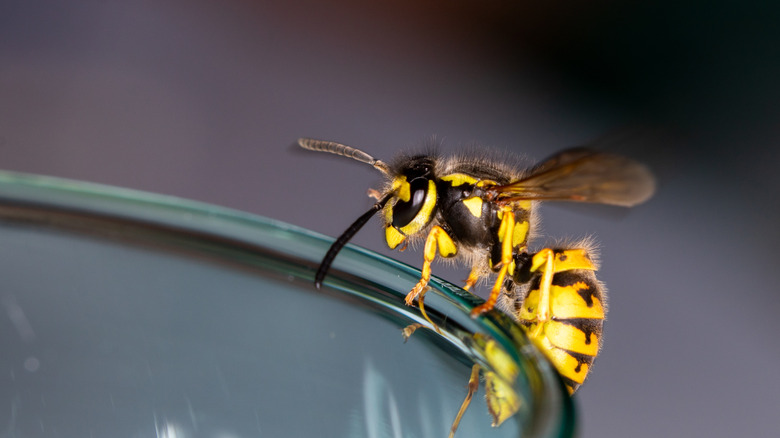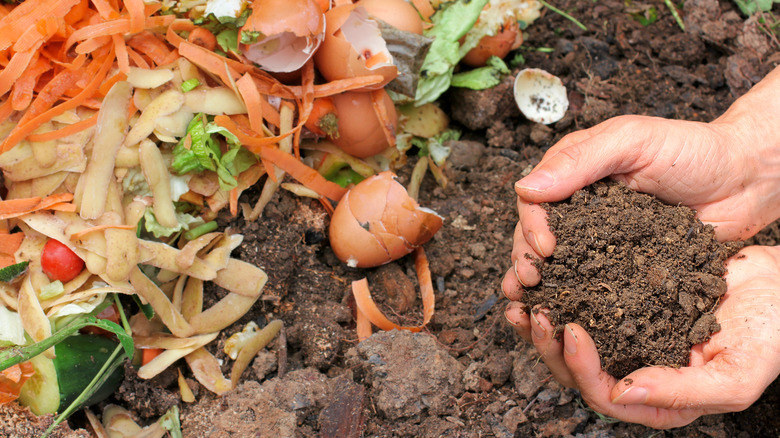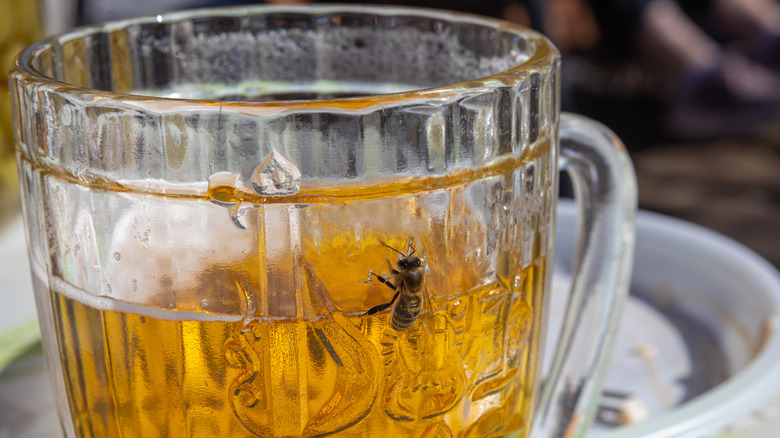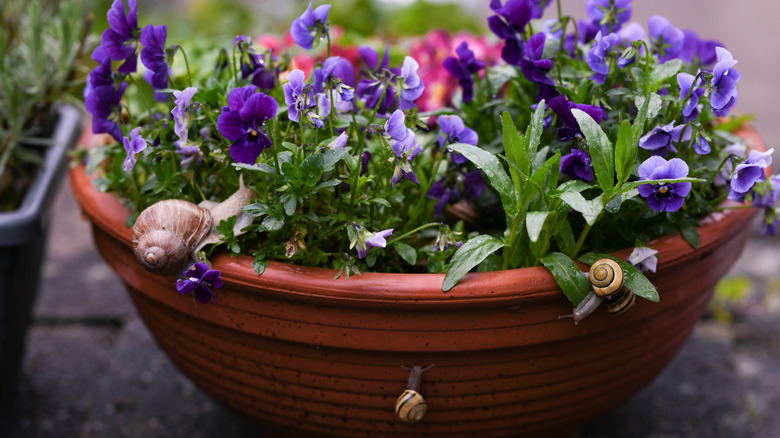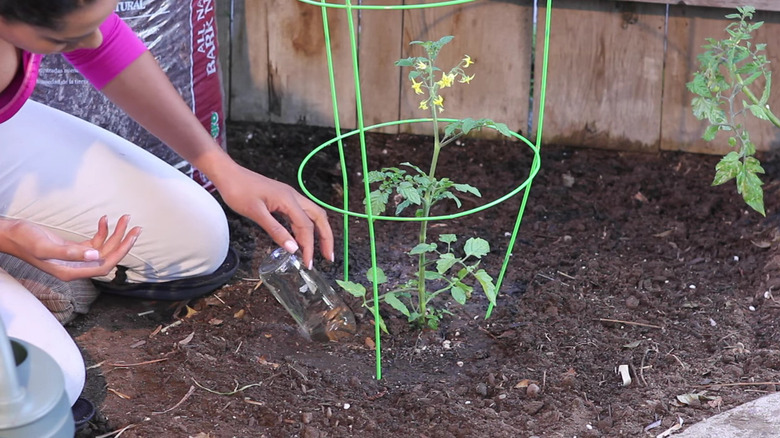Here's The Benefits Of Using Beer In Your Garden
Gardening can be taxing work, particularly on a hot summer's day. After all that digging, sowing, mowing, planting, pruning, watering, weeding, and grunting, an ice-cold beer is a fine fruit for your labors. But have you ever thought of sharing a little of that leftover liquid refreshment with your garden? The carbohydrates, calcium, magnesium, potassium, phosphorus, yeast, proteins, and sugars found in stale beer can be used in a whole host of wonderful and weird ways.
As Charles Bukowski once said, "We are here to drink beer. We are here to kill war. We are here to laugh at the odds and live our lives so well that death will tremble to take us." However, we're also here to tend our gardens, and some leftover beer can work wonders to that end. From a makeshift fertilizer to pest control, and a welcome reward at the end of another day of toil, beer can make your life as a gardener that much easier. So next time you've quenched your thirst, and there's still a little of the good stuff growing stale in the jar, don't pour it down the sink. Let your garden have a little drink. Here are just some of the benefits it entails.
It's a honey trap for flying insects
All critters have their purpose and place in the bigger scheme of things, but it's difficult to be philosophical when flies and wasps buzz around your garden, causing you to break out in a sweat and your blood pressure to rise. These flying nuisances can shatter the tranquility of your special place in a finger snap. To restore your peace of mind and a measure of equilibrium, use beer! Like most things in creation that walk, crawl, fly, or slither, a lot of winged insects have a taste for beer, or at least the sugar created during fermentation. Trust us; they find a little saucer filled with beer hard to resist.
To lure these suckers in for a session, fill a few bowls with beer and place them on the outside of your lawn party or casual get-together. Stale beer is usually best because you don't want to waste any of the fresh stuff on some pests. The buzzing visitors will make a direct line to the scattered beer baths, and there they'll stay, supping until they pass out. If you add a little liquid detergent to the mix, its stickiness will stop them from flying away. It may sound cruel, but if you've ever been stung by a wasp or had your barbecued steak ruined by flies, you'll know what's crueler!
It can give your compost a boost
In the old days, when compost heaps were just a euphemism for rubbish piles, you could throw everything from used cigarettes, chewing gum, and bootlaces on them. In these more environmentally aware times, we use compost as an actual fertilizer instead of a dumping ground for life's rich tapestry of disposal items. Consequently, we're very conscientious about what we can and cannot add to our little mountain of wonder grow. We know that things such as leaves, vegetable peelings, and fruit can be composted by bacteria, fungi, and insects in a way that burgers, cheese, and whisky wouldn't. But did you know that a little beer thrown on the compost can help speed up the decomposition process?
Successful composting relies on water and aeration, but alongside wine, beer can give compost an extra kick. The yeast in beer helps stimulate the beneficial bacteria that cause your compost's organic materials to decompose. Beer also contributes to the all-important moisture levels of your compost, but be careful not to add too much because a wet and ruined pile is just as ineffective as a bone-dry one. As well as pouring a little beer on the compost, you can mix it with soda, warm water, and ammonia to make a potent accelerant.
It can act as a makeshift fertilizer on a patchy lawn
By now you're probably thinking there's no end or limit to the glory of beer, but wait, there's more to come — a lot more. If your lawn looks a little patchy, you can use a little beer as a makeshift fertilizer and restore its green lushness. Although not as effective as regular fertilizers, beer is a handy go-to if you're in a fix. The nutrients it contains will help nourish your soil and keep your lawn healthy. Beer is also believed to combat fungi and is capable of neutralizing the damage caused by the nitrogen that exists in dog urine.
Beer is about 90% water, but it stands to reason that if you go pouring it on your lawn, you're going to attract an army of thirsty slugs and snails. To combat this, it's best to dilute your beer with a little water before you begin. For every 10-inch dry spot on your law, it's recommended to use 8 ounces of beer. Within a week, you should notice a difference, and the neighborhood garden snobs will no longer have reason to shake their heads and tut when seeing the state of your lawn.
It can attract pollinators
What a world it would be without pollinators — concrete, grim, and devoid of colors. If birds, bees, and butterflies didn't do their thing and encourage everything to grow, we'd be in big trouble. You could say the same about beer, so there's a kind of poetic synchronicity that beer in your garden can attract pollinators of all shapes and sizes. For best results, use diluted beer to avoid attracting unwanted pests such as slugs and snails.
Add 1.5 cups of beer to a mixing bowl with 5 bananas past their sell-by-date and add 1 cup of brown cane sugar. Mix everything thoroughly until a thick paste forms, and then leave the bowl high up on a branch or ledge. This is to capture the attention of passing pollinators but prevent unwanted ground crawlers from getting in on the action. The yeast in beer is similar to the yeast found in flower nectar. When nectar ferments in the high summer sun, it can create ethanol and cause the bees to get a little drunk. This hack works so well because they already have something of an acquired taste for booze.
It can help solve your slug and snail problem
Slugs and snails tend to ooze problems for gardeners of any ilk. They can cause a lot of damage to plants in a relatively short amount of time, and there always appears to be a neverending supply of them. The good news is that a little beer can help you nip any slug or snail problem in the bud. Leftover and stale beer can not only save you some money, but it can also help save the environment in a manner that chemical pesticides won't.
To prepare a slug trap using beer, identify the area in your garden where there's a lot of slithering activity and dig a hole to roughly contain the size of the can you'll be using. If you're dealing with a lot of slugs, dig another hole and grab another can. Place the can in a hole with about 1/3 of it sticking out. Place soil around the can's edges but leave its surface uncovered. When the slugs come oozing along, they won't be able to resist the lure of the beer and will eventually end up trapped inside, drunk as a lord. For best results, replace the cans every one to three days. This trap is also effective on earwigs, cockroaches, and fruit flies.
Recycle the beer bottles as garden features
Once you've finished unwinding with a beer or six and used the leftovers wisely for the benefit of your garden, don't be so quick to dump those beer bottles in the recycling bin. If you've ever fancied one of those pricey watering globes, but don't fancy splashing the cash, a standard beer bottle makes for a great substitute. The process is as simple as one, two, three! Grab yourself an empty bottle, turn it upside down, and plunge it into the soil near some plants or a flower bed. Keep pushing, and it will eventually stand proud and erect all by itself.
Next on the agenda is to pull it out slowly, fill it with some water, and stick it right back in. Those pretty plants and fancy flowers will love you for it because as the soil dries, your makeshift feeder will keep it moist and welcoming by lubricating it with a little water. It's a crafty hack, but the fun doesn't stop there. You can use old beer bottles in a range of innovative and useful ways. From using a selection of them to create fancy path edging, to making outdoor fairy light lanterns, candle holders, and bird feeders. The sky is the limit. But remember! Once your work is done, put up your feet and crack open a cold one. You deserve it!
